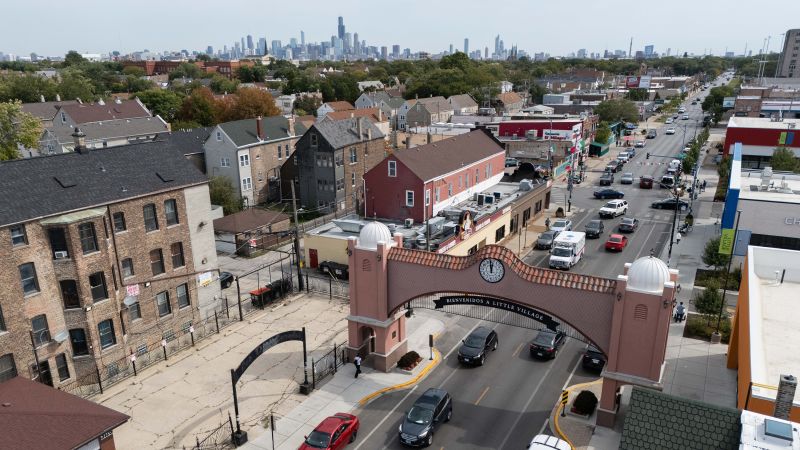‘It’s a business killer’: Trump’s immigration crackdown is crushing local economies

new York
—
In Chicago’s Little Village, sweeping eviction measures launched by the Trump administration have crippled the economy.
Business owners in Small villagewhat is 81% Hispanicsaid shoppers are too afraid to walk the streets of Chicago’s second-busiest commercial corridor. Sales have plummeted, employees are staying home and stores have temporarily closed their doors since the administration’s eviction campaign began in Chicago on September 8. More than 1,000 people were arrested at the premises of the Ministry of Homeland Security. “Operation Midway Blitz.”
The economic fallout from evictions typically focuses on the impact on sectors with large illegal immigrant labor forces, such as construction and agriculture. But undocumented immigrants aren’t just people who simply go to work every day. They are also consumers. They spent approximately 300 billion dollars in 2023, purchase goods and services that fuel the economy.
“It’s killing business,” said Mike Moreno, owner of that of Moreno liquor store and speakeasy. His father opened the store in Little Village in the 1970s and it was the first Latino-owned liquor store in Illinois.
He said sales had fallen 60% since September. Local residents and longtime business owners have been traumatized by immigration agents who roam the neighborhood, Moreno said, arresting both illegal immigrants and U.S. citizens.
“They run around the streets to scare us,” he said. “I never thought in a million years I would see something like this.”
Marcela Rodriguez, franchisee of Los Mangosa small Mexican-style ice cream chain, said “people aren’t going out. Kids aren’t going to school. It’s unbelievable.”
Her business “went completely downhill” starting in September, and several fearful employees changed their schedules to prepare food when the store was locked down and closed to customers.
Ice cream sales now correlate with the visibility of immigration officers in the neighborhood, she said.
“On quiet days, with few detentions, we see a slight increase in the number of customers.”
The Trump administration said as of last month, the country is on track to deport 600,000 illegal immigrants this year.
But the surge hurts businesses and local economies that rely on immigrants, legal and undocumented, who buy everything from food to cars to homes.
A record number of 14 million illegal immigrants, or around 5.6% of total households, lived in the United States in 2023. Twenty-six million people live in a household with at least one person without legal status.
Not only does this group spend hundreds of billions per year, but it paid more than $90 billion in federal, state and local taxes in 2024, helping to fund social services and programs like Social Security. The sales, property, business and other taxes they paid help support municipal and state budgets.
That’s why a slowdown in Little Village threatens to spill over into Chicago. The city could see a drop in tax revenue from retail sales, as well as store closures, a reduction in orders throughout the supply chain and a hit to the real estate market, said Teresa Córdova, director of the Big Cities Institute at the University of Illinois at Chicago.

Little Village became a landing point for Hispanic immigrants arriving in the United States beginning in the 1960s and 1970s. They helped stabilize the neighborhood, which had empty as Chicago lost manufacturing jobs and people moved to the suburbs.
“Without Chicago’s Latinos, we wouldn’t be able to revitalize ourselves the way we have,” Córdova said.
A similar story of immigrants breathing life into declining areas played out in many industrial cities in the North in the mid-20th century and later in the South, said AK Sandoval-Strausz, a history professor at Penn State University and author of the work. book “Barrio America: How Latin American Immigrants Saved the American City.” »
“The influx of immigrants into these neighborhoods has been an economic lifeline,” he said.
But White House spokesman Kush Desai called it a “silly exercise” to examine how much illegal immigrants spend and pay in taxes in isolation, because “the costs Americans pay because of illegal immigration are incalculable: crime, strained health care systems, inflated real estate costs, and schools overloaded with expensive ESL students.”
The White House emphasized research of the Federation for American Immigration Reform, which advocates for lower immigration levels, says American taxpayers spend at least $182 billion a year to cover costs related to illegal immigrants.
Mazola Corn Oil and Subprime Auto Loans
Immigrants and families unsure of their future in the United States are sending more money home – remittances to many Latin American countries are increasing double-digit increases – and they clutch their wallets.
TD Bank estimates that undocumented workers spending less will subtract 0.7 percentage points from consumer spending growth this year.
When Tricolor, a subprime auto lender primarily aimed at illegal immigrants in the Southwest, filed bankruptcy Last month, analysts said it was a sign of the strain on the economy serving undocumented immigrants.

Large food brands and retailers are also noticing an impact.
PepsiCo, Constellation Brands, Mondelez, Wingstop and Ross said Hispanic customers are spending less, especially at stores concentrated in heavily Hispanic neighborhoods.
Sales of Mazola corn oil have fallen among Hispanic consumers in the South, parent company Associated British Foods said last month during an earnings conference call.
“We have a very large share of Hispanic consumers in Mazola, and there is a lot of fear in that community,” CEO George Weston said. “We really hope this is temporary for all sorts of reasons.”
But the administration is ramping up its detention capacity to meet its goal of 1 million deportations a year, and the Republicans’ One Big Beautiful Bill Act triplets the Immigration and Customs Enforcement (ICE) budget.
The further the Trump administration goes, the bigger the hit to consumer spending, jobs and taxes that boost cities and states will be, said Eric Rodriguez, senior vice president of policy and advocacy at UnidosUS, a Hispanic civil rights group. Mass deportations were find also reduce the employment and wages of native-born citizens.
“There is no indication that what we are seeing now is going to stop or subside,” he said. “As the government increases mass evictions, the economic effects will be greater. »
ـــــــــــــــــــــــــــــــــــــــــــــــــــــــــــــــــــــــــــــــــــــــــــــــــــــــــــــــــ
Soon, there will be articles covering various topics, such as:
Insurance, Loans, Mortgage, Attorney, Credit, Lawyer, Donate, Degree, Hosting, Claim, Conference Call, Trading, Software, Recovery, Transfer, Gas/Electicity, Classes, Rehab, Treatment, Cord Blood, Best mesothelioma lawyer, Truck accident lawyer, Buy life insurance online, Business VoIP provider, EMR software for clinics, Structured settlement companies, motorcycle injury lawyer, motorcycle injury attorney, spinal cord injury attorney, birth injury attorney, auto accident injury attorney, spinal cord injury lawyer, car injury attorney, motorcycle accident injury attorney, catastrophic injury lawyer, birth injury lawyer, workplace injury attorney, motorcycle injury attorneys, head injury lawyer, personal injury attorneys, traumatic brain injury attorney, train accident lawyer, brain injury attorney, auto injury attorney, serious injury attorney, personal injury lawyer, truck injury lawyer, injury attorneys, back injury lawyer, injury lawyer near me, injury lawyer,
If you would like to see these articles, please write so in the comments.




